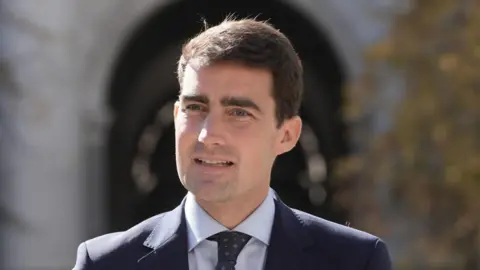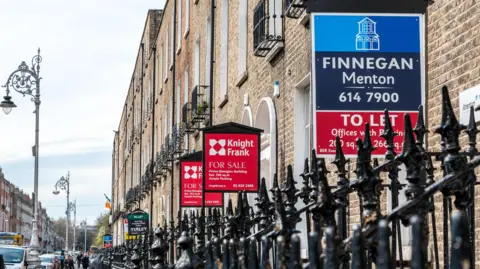Irish government announces tax cuts in pre-election budget
 PA
PAThe Republic of Ireland’s finance minister has announced personal tax cuts and cost-of-living supports in a giveaway pre-election budget.
There is growing speculation that the election will be held before Christmas.
Official figures published last week suggest Ireland will run a €25bn budget surplus this year, partially due to a huge tax windfall from Apple.
The minister, Jack Chambers, said that windfall will be set aside for investment in infrastructure.
Further details of how it will be spent will be laid out early next year.
Chambers said the money has "the capacity to be transformational" and will be used to tackle "known challenges" in housing, energy, water and transport infrastructure.
"Infrastructure is a fundamental component of Ireland’s competitiveness, and is vital to businesses, large and small, and to attracting new foreign investment into the State," he added.
The budget included €8.3bn in tax cuts and spending increases alongside one-off cost of living supports worth a further €2.2bn.
Chambers said his departmental forecasts suggest Ireland’s domestic economy will grow by 2.5% next year and 3% next year.
'People see through the spin'
Sinn Féin finance spokesperson Pearse Doherty described the government as "serial wasters", Irish broadcaster RTÉ has reported.
Speaking in the Dáil, Doherty said the Budget fails to address issues affecting childcare, the health service and housing.
"People see through the spin," he added. "Your job is not to spend money; it's to get results."
"Homeownership has collapsed under Fine Gael for young people," he added.
The centre-right led government has already faced criticism from the country’s independent budget watchdog, which has warned that increased spending risks overheating the economy.
The Irish Fiscal Advisory Council (IFAC) said the budget plans will increase public spending by 7%, breaking the government’s own rule that spending should rise by no more than 5% annually.
Inflation in Ireland has fallen to below 2% as international energy prices have moderated.
However there are some signs of growing, locally generated inflation in sectors like hospitality.
The Irish economy has performed robustly since the pandemic with the number of people in work at a record high and government finances bolstered by a continuing corporation tax windfall.
Investment in energy, water and housing
 Getty Images
Getty ImagesHowever the country’s infrastructure has not kept pace with that growth and significant investment is needed in energy, water and housing.
The coalition’s record on housing has been the key point of attack for the main opposition party, Sinn Féin.
Sinn Féin had been performing strongly in opinion polls but seen a significant dip in support in recent months.
